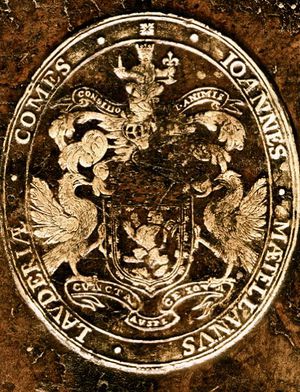Difference between revisions of "John Maitland 1616-1682"
m (Text replacement - "education::St Andrews University" to "the education::University of St Andrews") |
|||
| (One intermediate revision by the same user not shown) | |||
| Line 1: | Line 1: | ||
__NOTITLE__ | __NOTITLE__ | ||
| − | ===[[name::John]] [[name::MAITLAND]], 1st [[personal title::Duke of Lauderdale]] [[date of birth::1616]]-[[date of death::1682 | + | ===[[name::John]] [[name::MAITLAND]], 1st [[personal title::Duke of Lauderdale]] [[date of birth::1616]]-[[date of death::1682]]=== |
[[File:MaitlandJohn1.jpg| thumb | Armorial stamp of John Maitland (British Armorial Bindings) ]] | [[File:MaitlandJohn1.jpg| thumb | Armorial stamp of John Maitland (British Armorial Bindings) ]] | ||
Latest revision as of 01:15, 29 April 2022
John MAITLAND, 1st Duke of Lauderdale 1616-1682
Biographical Note
Born at Lethington Hall, Haddingtonshire, son of John Maitland, Earl of Lauderdale. He was educated at the University of St Andrews (matriculated 1631) before entering public life as one of the Scottish commissioners appointed in 1641 to negotiate with Charles I. He became an increasingly central figure in the politics of the 1640s, representing Scottish interests, but gradually became more aligned with the royal position and he was imprisoned during the 1650s, for supporting Charles II's abortive campaign in 1651. At the Restoration he was made Secretary of State for Scotland, and became a major (if controversial) figure in state affairs through the 1660s and 70s, particularly but not only for Scottish governance; he was made Duke of Lauderdale in 1672. By the time he suffered a stroke in 1680 his political star had waned, and he was increasingly out of favour. He made many enemies, and his career is summarised in ODNB as "a classic illustration of the corrupting effects of power".
Books
Maitland was widely recognised, even by his opponents, as a man who was "very learned ... He had read a great deal of divinity, and almost all the historians ancient and modern" (Gilbert Burnet). Much of his time in prison during the 1650s was spent in study, and he was fluent in several languages. He acquired books throughout his career, and numerous letters and papers survive documenting his dealings with booksellers. The handsome library room at Ham House, built in the 1670s, is much reproduced as one of the earliest survivals we have of a such a room made for a great house, but he kept books at all his houses, including several in London and at Thirlestaine Caste in Scotland; by the time of his death, he owned many thousands of books. The library at Ham was valued, shortly after his death, at £1109. His library was auctioned after his death, to help pay debts, in London in a series of sales between 1687 and 1692; a number of his manuscripts were bought by Samuel Pepys, John Moore and Hans Sloane. The books in the Ham library today are not Maitland's, therefore (they are an entirely unconnected collection of early books placed there by the National Trust in the 1930s to create the right impression).
Characteristic Markings
Maitland did not commonly inscribe his books, and only a few are known today. A small number of books decorated with one of several armorial stamps used by him are recorded in the Armorials Database.
Sources
- British Armorial Bindings.
- Alston, R. C. Inventory of sale catalogues 1676-1800. St Philip, 2010.
- Beadle, R. Medieval English manuscripts at auction, 1676-c.1700, The Book Collector 53 (2004), 46-63.
- Hutton, Ronald. "Maitland, John, duke of Lauderdale (1616–1682), politician." Oxford Dictionary of National Biography.
- Mandelbrote, G. The library of the Duke of Lauderdale, in C. Rowell (ed), Ham House, 2013, 222-231.
- Purcell, M. The Library at Ham House, The Book Collector 55 (2006), 509-24.
- Thornton, P. & M. Tomlin, The furnishing and decoration of Ham House, London, 1980.
- West, S. An architectural typology for the early modern country house library, 1660-1720, The Library 7th ser 14 (2013), 441-464.
